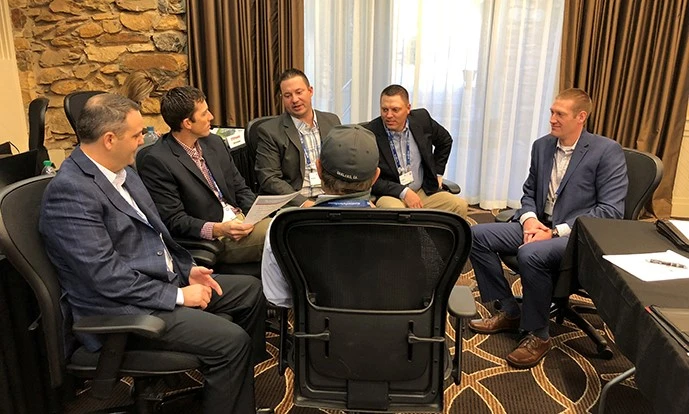
Before reading any further, update your resume. Start brainstorming ideas for a 250-word essay describing why three days of business training will help you, your crew and your course.
Done yet? Chill. Time is your friend. Applications for the 2019 Syngenta Business Institute won’t open until the spring. Attendees of the previous 10 versions urge colleagues to devote tremendous effort, energy and enthusiasm into applying. Who can’t learn more about the most important shade of green at any golf operation?
When two-dozen superintendents gather at Graylyn, a throwback hotel and conference center owned and operated by Arnold Palmer’s alma mater, next December, the same part of the program will generate animated conversations.
Topic: Leading across cultures & generations
Presenter: Amy Wallis
Get your ice cream – a bountiful SBI perk – ready.
Wallis is the organizational behavior expert who stands in front of the room and listens to supervisors reeling from a challenging year lament the work habits, attitudes and lifestyle choices of younger generations. To the surprise of some superintendents listening to Wallis, managing a golf course maintenance team isn’t much different than leading workers in other industries. Success hinges on motivating people hailing from diverse backgrounds.
Supervisors in all fields flop because they can’t connect with others who aren’t like them. Learning how to prevent managerial implosions takes longer than one continuing education class. “We’re not going to come to conclusions in a couple of hours,” Wallis says.
But quality discussions spark engagement and this one had plenty, with superintendents revealing the makeup of their respective crews during the culture portion of Wallis’s presentation and their bewilderment with millennials in the generational part. Don’t know what bewilderment means? Your phone will tell you. Phones, expectedly, crept into the generational conversation and superintendents are as split on their role in the workplace as they are on robotics, GPS, social media and other technology-themed topics. Conclusions on this topic are made in a couple of hours.
The American workforce, Wallis says, has shifted from an industrial economy to a service economy to a knowledge economy. Golf course maintenance touches all three segments, expanding the potential for workforce diversity. Some employees enjoy physically producing a daily product such as a well-conditioned course; satisfying members and guests motivates other employees. Data and design might attract another segment of employees, making a golf facility part of the knowledge economy. Imagine an automaker placing the assembly line, dealership and corporate offices on the same plot.
Understanding the differences between cultures and generations takes years of unwavering practice, and the process involves a tenuous start. “Unless proven otherwise, we assume everyone is like us,” Wallis says. The slides, words and activities Wallis crafts for her SBI presentation nudge superintendents toward considering a customized form of management. Different cultures and generations possess distinct values and motivations. Handling a 19-year-old who wants a summer job on a golf course because it fits an outdoorsy lifestyle like somebody striving for a superintendent job at an elite club is a modern managerial blunder. And good luck fielding a crew if you force employees to work every weekend and holiday.
Superintendents needed their employees more in a challenging 2018 than most of their employees needed a golf course maintenance job. Historically low unemployment rates and soaring wages mean hourly workers should have incredible leverage and options again in 2019.
Agronomy degrees are more plentiful than psychology degrees in the turf business. But people are changing faster than turfgrass varieties or irrigation practices, and higher cultural and generational learning must be incorporated into any continuing education strategy. “When you chose this career path, you probably didn’t know how much you’d be managing different generations and cultures,” Wallis says at the beginning of the session.
Enter the business for the turf or the sport. Establish longevity because of the different people you will lead.
Now about Arnold Palmer’s alma mater and Wallis’s place of employment …
Wake Forest is an enchanting place to learn for three days, even if the school doesn’t sit in the same location as it did during Palmer’s college days. Get a customized essay ready.
Guy Cipriano is GCI’s senior editor.
Latest from Golf Course Industry
- From the publisher’s pen: Conscientious of a bigger role
- Bernhard and Company partners with Laguna Golf Phuket
- Terre Blanche showcases environmental stewardship
- VIDEO: Introducing our December issue
- Bernhard and Company introduces Soil Scout
- Nu-Pipe donates to GCSAA Foundation’s Centennial Campaign
- GCSAA enhances golf course BMP tool
- Melrose leadership programs sending 18 to 2026 GCSAA Conference and Trade Show





